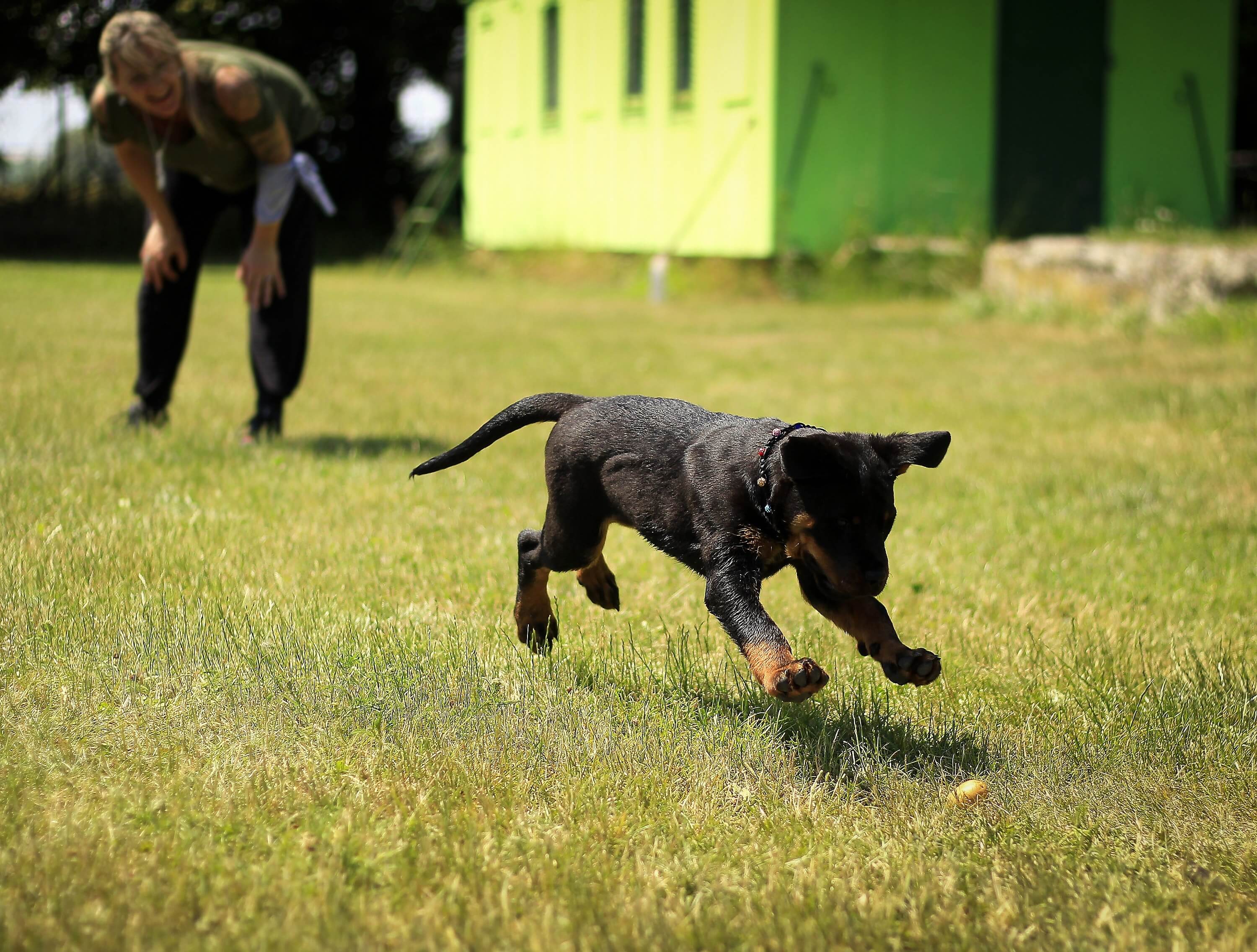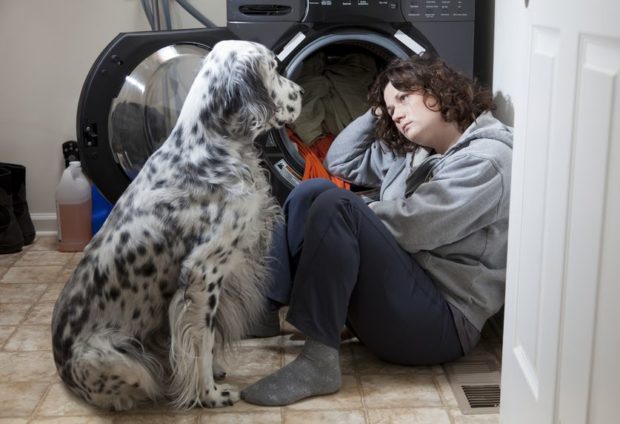
There is a lot to think about when it comes to service dogs: disability challenges, the dog’s needs, legal issues, public access, etc. Hence, to deal with the whole process of getting a service dog, most people will seek help from an expert in service dog training.
But, have you thought about training a service dog on your own and being a service dog trainer once you completed the training with a passing grade?
Do you have to be certified to train service dogs?
You may be surprised to learn that anyone can decide to train dogs and start the training on their own — there are no legally-mandated standards for service dog trainers, or pet dog trainers. Most trainers are self-taught or have learned techniques through other trainers, books, online courses, videos, or short seminars. Some of the best trainers you see on TV do not have school training themselves. That being said, if you are interested in becoming a trainer or train your own service dog, we highly suggest some kind of formal training.
Our Certified Service Dog Trainer Program is designed to empower individuals with the knowledge and skills needed to become certified service dog trainers. Whether you're a dog enthusiast looking to turn your love for canines into a rewarding career or a professional seeking to expand your expertise, our comprehensive curriculum provides the perfect foundation. The convenience of online learning is combined with one-on-one guidance from experienced professional trainers. The 10-week program is thoughtfully organized in an easy-to-follow format for three different levels:
Level 1 For beginner owner-trainers, and pet dog trainers
Level 2 For handlers with disabilities training their own service dogs
Level 3 For experienced dog trainers who want to become a service dog trainer

What does the self-training of a service dog involve?
With the comprehensive curriculum below, you will be well prepared to train service dogs with confidence and integrity. The course includes:
Module 1: Introduction to Service Dog Training
Embark on your journey with an in-depth exploration of service dogs and their crucial roles. Navigate through the laws and regulations governing service dogs while cultivating ethical considerations integral to service dog training.
Module 2: Dog Behavior and Psychology
Delve into the fascinating realm of canine behavior and psychology. Decode the language of dogs, exploring cognition, communication, and effective problem-solving techniques for behavioral issues.
Module 3: Dog Training Techniques
Unleash the power of positive reinforcement training methods, mastering clicker training and marker techniques. Learn the art of utilizing treats, toys, and praise effectively to communicate and connect with your canine companions.
Module 4: Basic Obedience Training
Build a solid foundation in basic obedience training, teaching essential commands such as sit, stay, down, and come. Explore loose leash walking, heeling, and recall training for comprehensive off-leash control.
Module 5: Advanced Service Dog Commands
Elevate your training expertise with advanced commands tailored for specific service tasks. Customize tasks for individual needs and conquer the challenge of proofing commands in diverse environments.
Module 6: Training for Specific Disabilities
Tailor your training approach to cater to the unique needs of individuals with disabilities. Collaborate with healthcare professionals and clients to ensure effective training strategies that enhance mobility, address autism, or support those with PTSD.
Module 7: Public Access Training
Navigate the complexities of teaching service dogs to behave impeccably in public settings. Master the art of handling distractions, maintaining focus, and ensuring service dogs are unobtrusive and well-behaved in various public environments.
Module 8: Assessment and Certification
Develop the skills to evaluate service dogs for readiness and effectiveness. Prepare for certification exams and assessments, understanding the importance of meticulous documentation and maintaining comprehensive training records.
Module 9: Business and Client Management
Acquire the tools to launch and manage a successful service dog training business. Hone your skills in client communication and education, strategic marketing, and building a loyal client base.
Module 10: Legal and Ethical Considerations
Navigate the intricate landscape of legal and ethical considerations in service dog training. Understand the rights and responsibilities of service dog handlers, address access challenges, and uphold ethical standards in treatment.
Module 11: Service Dog Health and Care
Prioritize the well-being of your service dogs by gaining insights into canine health and wellness. Learn to identify signs of stress or illness, address nutritional needs, and design appropriate exercise routines for these invaluable companions.
Module 12: Continuing Education and Professional Development
Embark on a lifelong commitment to growth with insights into the latest research and techniques. Network with fellow professionals, stay updated on industry advancements, and understand continuing education requirements to ensure your ongoing success in the field.
The Certified Service Dog Trainer Program is easy to fit into your schedule. You can complete lessons and assignments when you have time. The mix of video tutorials, materials, practical assignments with individual feedback from an instructor keeps the process interesting. You are encouraged to email questions so that your trainer tutor’s help is always on hand. Whether you want to work with your dog, expand your training skill set, or work for a non-profit service dog program, this course is a great investment.
Responsibilities of a Service Dog Trainer
Service dog trainers are professionals dedicated to training dogs to perform specific tasks that aid individuals with disabilities. Their responsibilities encompass a spectrum of tasks, including assessing dogs for suitability as service animals, designing and implementing training programs tailored to individual needs, and working closely with clients to ensure a successful partnership between dog and handler. Moreover, service dog trainers play a crucial role in educating handlers on how to effectively work with their service dogs and providing ongoing support to ensure the continued success of the partnership.
Types of Service Dogs and Their Specific Training Purposes
Service dogs come in various shapes, sizes, and breeds, each trained to perform tasks tailored to the needs of their handlers. Guide dogs, for instance, assist individuals who are blind or visually impaired by navigating obstacles, signaling changes in elevation, and guiding them safely through their environment. Hearing dogs alert individuals who are deaf or hard of hearing to important sounds such as doorbells, alarms, or approaching vehicles. Mobility assistance dogs provide support to individuals with mobility impairments by retrieving objects, opening doors, and providing balance assistance. Additionally, there are service dogs trained to assist individuals with medical conditions such as diabetes, epilepsy, or psychiatric disorders by alerting to changes in their handler's condition and providing emotional support as needed.
Qualities and Skills Required to Excel as a Service Dog Trainer
To excel as a service dog trainer, one must possess a unique blend of qualities and skills that go beyond a love for dogs.
Patience, compassion, and empathy are essential traits, as service dog training can be challenging and requires a deep understanding of the needs and limitations of both dogs and handlers. Effective communication skills are also crucial, as trainers must be able to convey instructions clearly to both dogs and clients and provide feedback in a constructive and supportive manner. Additionally, a solid understanding of canine behavior, learning theory, and training techniques is essential for designing effective training programs and addressing behavioral issues that may arise during the training process. Adaptability and problem-solving skills are also valuable traits, as service dog trainers must be able to tailor their approach to meet the unique needs of each dog and handler and overcome obstacles that may arise during training.
Conclusion
Becoming a service dog trainer is a challenging yet immensely rewarding journey. By understanding the role, gaining experience, and honing your skills, you can make a meaningful impact on the lives of individuals with disabilities and their canine companions. Whether you choose to work independently or with an established organization, the satisfaction of witnessing the bond between a service dog and its handler is unparalleled. If you're passionate about dogs and dedicated to helping others, pursuing a career as a service dog trainer could be the perfect fit for you.













